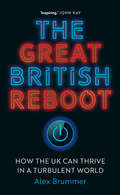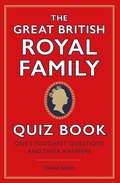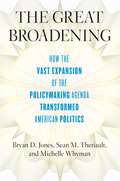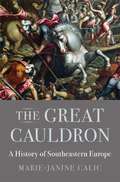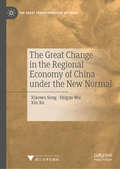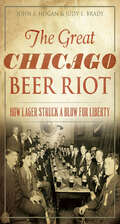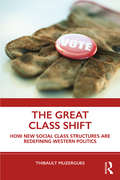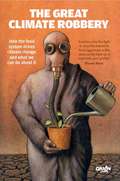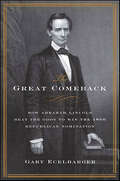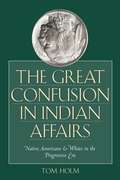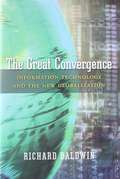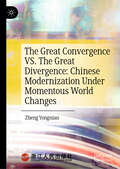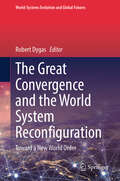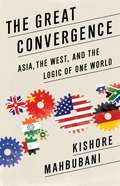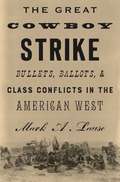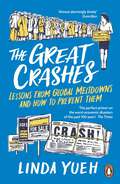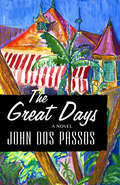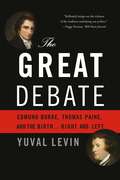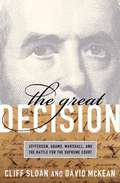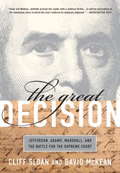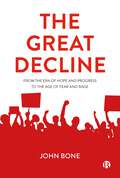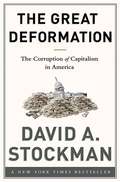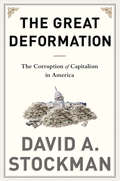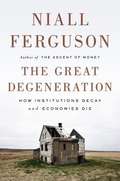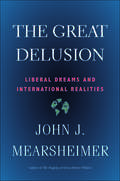- Table View
- List View
The Great British Reboot: How the UK Can Thrive in a Turbulent World
by Alex BrummerAn optimistic exploration of how, through radical economic reform, the United Kingdom can prosper and flourish in the new global economy Taking a refreshingly realistic approach, Alex Brummer outlines how our current moment can be reshaped into an unprecedented opportunity for economic prosperity. With a new long-term approach, Britain can capitalize on the ever-changing global market, its brilliant research universities, and new technological developments. Drawing on firsthand interviews with the leading minds in business and his own expertise as a seasoned economic journalist, Brummer creates an inspiring investigation into how careful planning and innovative reform can lead to a flourishing economy after Brexit.
The Great British Royal Family Quiz Book: One's Toughest Questions and Their Answers
by Daniel SmithCalling all royalists, put your regal knowledge to the test with this fun and fascinating collection of quizzes.Do you know the full names of the Duke and Duchess of Cambridge's three children? Or Queen Elizabeth's rumoured favourite tipple? Which royal has his toothpaste squeezed for him every morning, and whose recent decision to take 'a leap of faith' has caused ripples around the world? Put your loyalty and knowledge to the test with this charming miscellany that celebrates kings and queens from 1066 to the present day. A delightful tour of the British monarchy, from joyful royal weddings to tabloid-grabbing scandals, the boozy diet of James I's elephant to Queen Elizabeth II's favourite nail polish colour. A treasure trove of quirky facts and fascinating trivia, readers will discover hours of fun with this selection of achievable quizzes. Answers are included at the back of the book.
The Great Broadening: How the Vast Expansion of the Policymaking Agenda Transformed American Politics
by Bryan D. Jones Sean M. Theriault Michelle WhymanBeginning in the late 1950s and continuing through the 1970s, the United States experienced a vast expansion in national policy making. During this period, the federal government extended its scope into policy arenas previously left to civil society or state and local governments. With The Great Broadening, Bryan D. Jones, Sean M. Theriault, and Michelle Whyman examine in detail the causes, internal dynamics, and consequences of this extended burst of activity. They argue that the broadening of government responsibilities into new policy areas such as health care, civil rights, and gender issues and the increasing depth of existing government programs explain many of the changes in America politics since the 1970s. Increasing government attention to particular issues was motivated by activist groups. In turn, the beneficiaries of the government policies that resulted became supporters of the government’s activity, leading to the broad acceptance of its role. This broadening and deepening of government, however, produced a reaction as groups critical of its activities organized to resist and roll back its growth.
The Great Cauldron: A History of Southeastern Europe
by Marie-Janine CalicWe often think of the Balkans as a region beset by turmoil and backwardness, but from late antiquity to the present it has been a dynamic meeting place of cultures and religions. Marie-Janine Calic invites us to reconsider the history of this intriguing, diverse region as essential to the story of global Europe.
The Great Change in the Regional Economy of China under the New Normal (The Great Transformation of China)
by Xin Xu Xiaowu Song Shiguo WuThis book provides a comparative analysis of the regional development strategies of east, west, northeast and central China and the development of important economic regions including the Yangtze River Delta, the Pearl River Delta, Beijing-Tianjin-Hebei Region, the middle reaches of the Yangtze River, Chengdu-Chongqing and central-southern areas of Liaoning Province. The book reveals some key issues faced in China's regional development and analyzes their causes while delving into new trends of regional development since the 18th CPC National Congress. The book concludes by proposing new ideas for regional development under the new normal and analyzing experiences of other major powers in carrying out coordinated regional development. This book will be of interest to urbanists, journalists, and China scholars.
The Great Chicago Beer Riot: How Lager Struck a Blow for Liberty
by Judy E. Brady John F HoganAn &“exhaustive&” account of the pivotal incident between &“native-born Protestant Chicagoans who founded the city and newer German and Irish immigrants&” (Bloomberg). In 1855, when Chicago&’s recently elected mayor Levi Boone pushed through a law forbidding the sale of alcohol on Sunday, the city pushed back. To the German community, the move seemed a deliberate provocation from Boone&’s stridently anti-immigrant Know-Nothing Party. Beer formed the centerpiece of German Sunday gatherings, and robbing them of it on their only day off was a slap in the face. On April 21, 1855, an armed mob poured across the Clark Street Bridge and advanced on city hall. The Chicago Lager Riot resulted in at least one death, nineteen injuries and sixty arrests. It also led to the creation of a modern police department and the political alliances that helped put Abraham Lincoln in the White House. Authors Judy E. Brady and John F. Hogan explore the riot and its aftermath, from pint glass to bully pulpit.
The Great Class Shift: How New Social Class Structures are Redefining Western Politics
by Thibault MuzerguesThis thought-provoking book offers a new global approach to understand how four social class structures have rocked our political systems, to the extent that no politician or political party can exist today without claiming to be speaking on their behalf, and no politician can hope to win an electoral majority without building a coalition among these classes. Based on a four-fold analysis - Urban and Liberal Creatives, Suburban Middle Class, White Working Class and the Millennials - this book shows that while many have focused on a supply-side vision of politics to explain the upheavals in our political party systems, a vision centred on demand – and the Weberian take on political parties as vehicles for class interests – is more compelling. In 2016, our political world was changed forever by the victories of Brexit in the UK and Donald Trump in the USA. Far from being confined to the Anglosphere however, changes have also rocked the political landscapes in Europe. As the crisis of 2008 has shaken the foundations of Western societies, shrinking the size of the previously all-powerful middle class, new classes have emerged, and with them a new political demand that new (or old) parties have tried to satisfy. This book will be of key interest to political practitioners (politicians, advisors/consultants, journalists, political pundits, party builders, and government officials) and more broadly to academics, students and readers of European and Western politics, political sociology, party politics and political parties, and electoral demographics.
The Great Climate Robbery: How the Food System Drives Climate Change and What We Can Do About It
by Grain Henk HobbelinkIn The Great Climate Robbery highly respected non-profit Grain connects analysis of the food system to larger issues affecting the planet, and links peoples' struggles over food to climate change.The collected articles in this book will help readers to understand the ways in which corporations seek to control the food system, and give information and analysis to challenge this control. This book features endorsements from Naomi Klein, Bill McKibben, and Vandana Shiva.Henk Hobbelink is a member of the Grain collective, an international non-profit that works to support small farmers and social movements in their struggles for community-controlled and biodiversity-based food systems.
The Great Comeback: How Abraham Lincoln Beat the Odds to Win the 1860 Republican Nomination
by Gary EcelbargerIn the fall of 1858, Abraham Lincoln looked to be anything but destined for greatness. Just shy of his fiftieth birthday, Lincoln was wallowing in the depths of despair following his loss to Stephen Douglas in the 1858 senatorial campaign and was taking stock in his life. The author takes us on a journey with Abraham Lincoln from the last weeks of 1858 until the end of May in 1860, on the road to his unlikely Republication presidential nomination. In tracing Lincoln's steps from city to city, from one public appearance to the next along the campaign trail, we see the future president shape and polish his public persona. Although he had accounted himself well in the famous Lincoln-Douglas debates, the man from Springfield, Illinois, he was nevertheless seen as the darkest of dark horses for the highest office in the land. Upon hearing Lincoln speak, one contemporary said, "I will not say he reminded me of Satan, but he certainly was the ungodliest figure I had ever seen." The reader sees how this "ungodliest" of figures shrewdly spun his platform to crowds far and wide and, in doing so, became a public celebrity on par with any throughout the land.This is a story teeming with drama and intrigue about an event that no one could fathom occurring today...yet it absolutely happened in with America seven score and eight years ago, when Lincoln, the man, took his first steps on the way toward becoming Abraham Lincoln, the legendary leader and most respected president of American history.
The Great Confusion in Indian Affairs: Native Americans & Whites in the Progressive Era
by Tom HolmThe United States government thought it could make Indians "vanish. " After the Indian Wars ended in the 1880s, the government gave allotments of land to individual Native Americans in order to turn them into farmers and sent their children to boarding schools for indoctrination into the English language, Christianity, and the ways of white people. Federal officials believed that these policies would assimilate Native Americans into white society within a generation or two. But even after decades of governmental efforts to obliterate Indian culture, Native Americans refused to vanish into the mainstream, and tribal identities remained intact. This revisionist history reveals how Native Americans' sense of identity and "peoplehood" helped them resist and eventually defeat the U. S. government's attempts to assimilate them into white society during the Progressive Era (1890s-1920s). Tom Holm discusses how Native Americans, though effectively colonial subjects without political power, nonetheless maintained their group identity through their native languages, religious practices, works of art, and sense of homeland and sacred history. He also describes how Euro-Americans became increasingly fascinated by and supportive of Native American culture, spirituality, and environmental consciousness. In the face of such Native resiliency and non-Native advocacy, the government's assimilation policy became irrelevant and inevitably collapsed. The great confusion in Indian affairs during the Progressive Era, Holm concludes, ultimately paved the way for Native American tribes to be recognized as nations with certain sovereign rights.
The Great Convergence
by Richard BaldwinFrom 1820 to 1990 the share of world income going to today's wealthy nations soared from 20% to 70%. That share has recently plummeted. Richard Baldwin shows how the combination of high tech with low wages propelled industrialization in developing nations, deindustrialization in developed nations, and a commodity supercycle that is petering out.
The Great Convergence VS. The Great Divergence: Chinese Modernization Under Momentous World Changes
by Yongnian ZhengThis book explores what's happening in international affairs and whether the changes will bring opportunity or crisis to China's modernization. How can China reverse the trend of anti-globalization and lead a new wave of globalization? How can Chinese thinkers bring about another great convergence of globalization and modernization? In-depth thinking about these questions and answering them form the theme of this book. This book puts the main focus on clarifying the relationship between China&’s modernization process and economic globalization, exploring the deep-seated reasons for the momentous world changes and the great challenges they have posed to the China&’s continued modernization. In particular, it answers the question &“What is China&’s next step?&”, providing the readers with profound insights and forward-looking thinking to understand the changing situation of the world and grasp the future of China.
The Great Convergence and the World System Reconfiguration: Toward a New World Order (World-Systems Evolution and Global Futures)
by Robert DygasFor decades, the global balance of power has been shaped by a handful of dominant nations, primarily the United States and Western Europe. Yet, the rise of emerging powers like China, India, Brazil, and Russia is transforming the foundations of the world order. These nations are challenging the traditional dominance of the West, promoting a multipolar world, and reshaping international norms, trade networks, and geopolitical alliances. This book explores the profound implications of this shift from a geoeconomic perspective, and the change of the geoeconomic paradigm, focusing on how these emerging powers influence global governance, economic policies, and security dynamics. It examines pivotal initiatives like China&’s Belt and Road Initiative, India&’s expanding global partnerships, and the role of BRICS in creating alternative financial systems to rival Western-dominated institutions such as the IMF and World Bank. By analyzing the complex interplay of cooperation, competition, and confrontation between established and rising powers, the book sheds light on critical questions: How are emerging powers shaping the new geoeconomic paradigm? Can the Global South achieve lasting economic independence? What strategies can prevent escalating international conflicts? How will digital mobility evolve in a changing global economy? Combining a deep analysis of foreign policies, hard and soft power strategies, and regional responses, this book provides readers with a nuanced understanding of how both traditional and emerging powers are forging new global and regional orders. With its timely insights, this book is an essential resource for academics, policymakers, researchers, and anyone aiming to grasp the future of international relations in an era of transformation.
The Great Convergence: Asia, the West, and the Logic of One World
by Kishore MahbubaniThe twenty-first century has seen a rise in the global middle class that brings an unprecedented convergence of interests and perceptions, cultures and values. Kishore Mahbubani is optimistic. We are creating a new global civilization. Eighty-eight percent of the world's population outside the West is rising to Western living standards, and sharing Western aspirations. Yet Mahbubani, one of the most perceptive global commentators, also warns that a new global order needs new policies and attitudes. Policymakers all over the world must change their preconceptions and accept that we live in one world. National interests must be balanced with global interests. Power must be shared. The U. S. and Europe must cede some power. China and India, Africa and the Islamic world must be integrated. Mahbubani urges that only through these actions can we create a world that converges benignly. This timely book explains how to move forward and confront many pressing global challenges.
The Great Cowboy Strike: Bullets, Ballots & Class Conflicts in the American West
by Mark LauseWhen cowboys were workers and battled their bossesIn the pantheon of American icons, the cowboy embodies the traits of “rugged individualism,” independent, solitary, and stoical. In reality, cowboys were grossly exploited and underpaid seasonal workers, who responded to the abuses of their employers in a series of militant strikes. Their resistance arose from the rise and demise of a “beef bonanza” that attracted international capital. Business interests approached the market with the expectation that it would have the same freedom to brutally impose its will as it had exercised on native peoples and the recently emancipated African Americans. These assumptions contributed to a series of bitter and violent “range wars,” which broke out from Texas to Montana and framed the appearance of labor conflicts in the region. These social tensions stirred a series of political insurgencies that became virtually endemic to the American West of the Gilded Age. Mark A. Lause explores the relationship between these neglected labor conflicts, the “range wars,” and the third-party movements. The Great Cowboy Strike subverts American mythology to reveal the class abuses and inequalities that have blinded a nation to its true history and nature
The Great Crashes: Lessons from Global Meltdowns and How to Prevent Them
by Linda Yueh'A masterclass in spotting the early signs of a crisis' Nouriel Roubini'This is the historical perspective we need' John Kay'A first point of entry for anybody who wants to learn how the world sleep-walked into multiple crashes' Daron Acemoglu'Fascinating, well-written and authoritative' Tim Harford-----------------------------------------------------------------The global economy has weathered the most tumultuous century in modern financial history. Since America's Wall Street Crash of 1929, the global economy has weathered the most tumultuous century in financial history. From the currency crises of the 1980s, to Japan's housing meltdown, the dot com boom and bust, the global financial crash and the COVID pandemic, crash after crash has sent shockwaves through our world.The Great Crashes tells the stories of ten of these historic financial events. They serve as a series of cautionary tales, each with their own lessons to be learnt. With clear-eyed analysis, renowned economist Professor Linda Yueh uses these meltdowns to extract a critical three-step framework to help recognise the early signs of a crash, mitigate the effects and even prevent them in the future. There is very little that is certain in economics, except for this: there will be another financial crisis.Combining her in-depth knowledge with compelling storytelling, The Great Crashes is essential reading that offers urgent lessons for the modern world.-----------------------------------------------------------------'An important contribution that can help society anticipate and tackle potential crashes in the future' Christine Lagarde
The Great Days: A Novel
by John Dos PassosIn this semi-autobiographical novel, an American named Roland Lancaster has a doomed affair with a younger woman, Elsa, in Cuba during World War II. The love story, in its happiest moments, parallels the idyllic life that author John Dos Passos had with his first wife, Katy. The Great Days plots a key concern of the author's in the 1950s--America's rise to global prominence during World War II, and its loss of power in the years following the peace. In preparing the novel, Dos Passos studied James V. Forrestal, Secretary of Defense from 1947 to 1949. In his notes on the novel, he quotes Forrestal: "to achieve accommodation between the power we now possess, our reluctance to use it positively, the realistic necessity for such use, and our national ideals."
The Great Debate: Edmund Burke, Thomas Paine, and the Birth of Right and Left
by Yuval LevinFor more than two centuries, our political life has been divided between a party of progress and a party of conservation. In The Great Debate, Yuval Levin explores the origins of the left/right divide in America by examining the views of the men who best represent each side of that debate: Edmund Burke and Thomas Paine. In a groundbreaking exploration of the roots of our political order, Levin shows that American partisanship originated in the debates over the French Revolution, fueled by the fiery rhetoric of these ideological titans. Levin masterfully shows how Burke and Paine’s differing views continue to shape our current political discourse--on issues ranging from gun control and abortion to welfare and economic reform. Essential reading for anyone seeking to understand Washington’s often acrimonious rifts, The Great Debate offers a profound examination of what conservatism, liberalism, and the debate between them truly amount to.
The Great Decision: Jefferson, Adams, Marshall, and the Battle for the Supreme Court
by Cliff Sloan David Mckean"The Great Decision" tells the riveting story of John Marshall and of the landmark court case that not only empowered the Supreme Court, but also transformed the idea of the separation of powers into a working blueprint for America's modern state.
The Great Decision: Jefferson, Adams, Marshall, and the Battle for the Supreme Court
by Cliff Sloan David MckeanIn 1800, the United States teetered on the brink of a second revolution. The presidential election between Adams and Jefferson was a bitterly contested tie, and the government neared collapse. The Supreme Court had no clear purpose or power-no one had even thought to build it a courtroom in the new capital city. When Adams sought to prolong his policies in defiance of the electorate by packing the courts, the fine words of the new Constitution could do nothing to stop him. It would take a man to make those words good, and America found him in John Marshall. The Great Decisiontells the riveting story of Marshall and of the landmark court case,Marbury v. Madison, through which he empowered the Supreme Court and transformed the idea of the separation of powers into a working blueprint for our modern state. Rich in atmospheric detail, political intrigue, and fascinating characters,The Great Decisionis an illuminating tale of America’s formative years and of the evolution of our democracy.
The Great Decline: From the Era of Hope and Progress to the Age of Fear and Rage
by John BoneIt seems clear that many formerly stable societies in wealthy developed countries appear to be falling into an apparent state of ‘permacrisis' accompanied by an increasingly angry and irrational social and political culture that is undermining the peace and stability of our societies and democratic institutions, from the local to the global. Applying an original biosocial approach (the social map), and drawing on ideas and evidence from sociology, history and political economy, to psychology, neuroscience and epigenetics, John Bone argues that conditions in our turbocapitalist and increasingly estranged, media dominated societies have created a toxic environment, deeply damaging to our mental and physical health. As well as shedding new light on our current troubles, Bone also outlines why this leaves us ill prepared to deal with two of the greatest challenges confronting humanity: the rise of AI and automation and how we deal with climate change.
The Great Deformation: The Corruption of Capitalism in America
by David A. StockmanA "New York Times" bestseller "The Great Deformation" is a searing look at Washington's craven response to the recent myriad of financial crises and fiscal cliffs. It counters conventional wisdom with an eighty-year revisionist history of how the American state--especially the Federal Reserve--has fallen prey to the politics of crony capitalism and the ideologies of fiscal stimulus, monetary central planning, and financial bailouts. These forces have left the public sector teetering on the edge of political dysfunction and fiscal collapse and have caused Americas private enterprise foundation to morph into a speculative casino that swindles the masses and enriches the few. Defying right- and left-wing boxes, David Stockman provides a catalogue of corrupters and defenders of sound money, fiscal rectitude, and free markets. The former includes Franklin Roosevelt, who fathered crony capitalism; Richard Nixon, who destroyed national financial discipline and the Bretton Woods gold-backed dollar; Fed chairmen Greenspan and Bernanke, who fostered our present scourge of bubble finance and addiction to debt and speculation; George W. Bush, who repudiated fiscal rectitude and ballooned the warfare state via senseless wars; and Barack Obama, who revived failed Keynesian "borrow and spend" policies that have driven the national debt to perilous heights. By contrast, the book also traces a parade of statesmen who championed balanced budgets and financial market discipline including Carter Glass, Harry Truman, Dwight Eisenhower, Bill Simon, Paul Volcker, Bill Clinton, and Sheila Bair. Stockmans analysis skewers Keynesian spenders and GOP tax-cutters alike, showing how they converged to bloat the welfare state, perpetuate the military-industrial complex, and deplete the revenue base--even as the Feds massive money printing allowed politicians to enjoy "deficits without tears. " But these policies have also fueled new financial bubbles and favored Wall Street with cheap money and rigged stock and bond markets, while crushing Main Street savers and punishing family budgets with soaring food and energy costs. "The Great Deformation" explains how we got here and why these warped, crony capitalist policies are an epochal threat to free market prosperity and American political democracy.
The Great Deformation: The Corruption of Capitalism in America
by David A. StockmanA New York Times bestseller The Great Deformation is a searing look at Washington’s craven response to the recent myriad of financial crises and fiscal cliffs. It counters conventional wisdom with an eighty-year revisionist history of how the American state-especially the Federal Reserve-has fallen prey to the politics of crony capitalism and the ideologies of fiscal stimulus, monetary central planning, and financial bailouts. These forces have left the public sector teetering on the edge of political dysfunction and fiscal collapse and have caused America’s private enterprise foundation to morph into a speculative casino that swindles the masses and enriches the few. Defying right- and left-wing boxes, David Stockman provides a catalogue of corrupters and defenders of sound money, fiscal rectitude, and free markets. The former includes Franklin Roosevelt, who fathered crony capitalism; Richard Nixon, who destroyed national financial discipline and the Bretton Woods gold-backed dollar; Fed chairmen Greenspan and Bernanke, who fostered our present scourge of bubble finance and addiction to debt and speculation; George W. Bush, who repudiated fiscal rectitude and ballooned the warfare state via senseless wars; and Barack Obama, who revived failed Keynesian "borrow and spend” policies that have driven the national debt to perilous heights. By contrast, the book also traces a parade of statesmen who championed balanced budgets and financial market discipline including Carter Glass, Harry Truman, Dwight Eisenhower, Bill Simon, Paul Volcker, Bill Clinton, and Sheila Bair. Stockman’s analysis skewers Keynesian spenders and GOP tax-cutters alike, showing how they converged to bloat the welfare state, perpetuate the military-industrial complex, and deplete the revenue base-even as the Fed’s massive money printing allowed politicians to enjoy "deficits without tears. ” But these policies have also fueled new financial bubbles and favored Wall Street with cheap money and rigged stock and bond markets, while crushing Main Street savers and punishing family budgets with soaring food and energy costs. The Great Deformation explains how we got here and why these warped, crony capitalist policies are an epochal threat to free market prosperity and American political democracy.
The Great Degeneration: How Institutions Decay and Economies Die
by Niall FergusonFrom renowned historian Niall Ferguson, a searching and provocative examination of the widespread institutional rot that threatens our collective futureWhat causes rich countries to lose their way? Symptoms of decline are all around us today: slowing growth, crushing debts, increasing inequality, aging populations, antisocial behavior. But what exactly has gone wrong? The answer, Niall Ferguson argues in The Great Degeneration, is that our institutions--the intricate frameworks within which a society can flourish or fail--are degenerating.Representative government, the free market, the rule of law, and civil society--these are the four pillars of West European and North American societies. It was these institutions, rather than any geographical or climatic advantages, that set the West on the path to global dominance beginning around 1500. In our time, however, these institutions have deteriorated in disturbing ways. Our democracies have broken the contract between the generations by heaping IOUs on our children and grandchildren. Our markets are hindered by overcomplex regulations that debilitate the political and economic processes they were created to support; the rule of law has become the rule of lawyers. And civil society has degenerated into uncivil society, where we lazily expect all of our problems to be solved by the state.It is institutional degeneration, in other words, that lies behind economic stagnation and the geopolitical decline that comes with it. With characteristic verve and historical insight, Ferguson analyzes not only the causes of this stagnation but also its profound consequences. The Great Degeneration is an incisive indictment of an era of negligence and complacency. While the Arab world struggles to adopt democracy and China struggles to move from economic liberalization to the rule of law, our society is squandering the institutional inheritance of centuries. To arrest the breakdown of our civilization, Ferguson warns, will take heroic leadership and radical reform.
The Great Delusion: Liberal Dreams and International Realities
by John J. MearsheimerA major theoretical statement by a distinguished political scholar explains why a policy of liberal hegemony is doomed to fail In this major statement, the renowned international-relations scholar John Mearsheimer argues that liberal hegemony, the foreign policy pursued by the United States since the Cold War ended, is doomed to fail. It makes far more sense, he maintains, for Washington to adopt a more restrained foreign policy based on a sound understanding of how nationalism and realism constrain great powers abroad. It is widely believed in the West that the United States should spread liberal democracy across the world, foster an open international economy, and build institutions. This policy of remaking the world in America’s image is supposed to protect human rights, promote peace, and make the world safe for democracy. But this is not what has happened. Instead, the United States has ended up as a highly militarized state fighting wars that undermine peace, harm human rights, and threaten liberal values at home. Mearsheimer tells us why this has happened.
